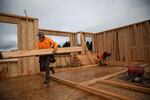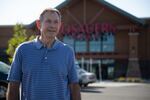Driving along South Hillhurst Road in Ridgefield, Washington, there are telltale signs of a town becoming a small city.
Country roads and pastures morph into city arterials beset by orange construction cones. New homes materialize, as does a newly built, $20 million sports complex. Portable buildings sit near schools trying to accommodate an influx of students.
Related: OPB’s 2020 election coverage, ballot guide and results
Housing and road development line other streets as well, and a freshly opened supermarket sits on the road to the freeway.
“We have so many people moving into the city of Ridgefield,” said Mayor Don Stose, sitting in the supermarket’s deli, discussing how the transformation of this once rural area will affect politics here. “It’s difficult to determine, at this point, where they’re going to lean.”
Stose described Ridgefield’s politics as an urban and rural swirl. Just a dozen miles north of Portland, the once quiet farming town’s population doubled from 4,800 to about 10,000 over the last decade. It has felt to some, he said, like urbanization knocking.
“You have the constituents who were born and raised here who are not happy about the way we’re growing. They wanted it to stay a ma and pa community, kind of stay like ‘Mayberry,’” he said, shrugging out a laugh.
Ridgefield is a microcosm of southwest Washington’s politically shifting 3rd Congressional District. Portland suburbs that could bring more Democratic voters have crept in. That’s made the district home to some of the most contentious races in recent years.
“The Democrats have had their eyes on it and think they can flip it,” said Jim Moore, a political scientist from Pacific University. “And the demographics are getting closer and closer in terms of registration, in terms of new people moving to the area.”
Carolyn Long, a political science professor turned political candidate, came within roughly five points during 2018′s “Blue Wave” midterms. She came the closest to toppling U.S. Rep. Jaime Herrera Beutler since the Republican from Battle Ground first won office in 2010. The incumbent has regularly beat opponents by double-digits at the polls.
This year’s rematch for southwest Washington, the GOP’s last territory on the western seaboard, has invited speculation from outside media and political watchdogs.
“The 3rd District still has a high amount of (attention) because both parties think they can win it,” Moore said. “With a strong Democrat candidate, Republicans know they have to put up a good defense.”

A home is under construction in Ridgefield in May. Ridgefield, on the outskirts of the Portland metropolitan area, is regularly listed as one of the fastest growing places in Washington.
Troy Brynelson / OPB
Missing yellow dog Democrats
Advancing suburbia, like that in Ridgefield, has been an advantage for Long.
In the 2018 primaries, she won the precinct along South Hillhurst Road, where city staff say 550 new homes have been built in the last five years. In fact, Long won three of the town’s five precincts. Herrera Beutler had never lost there before.
“We’ve seen that phenomenon before as the Portland suburbs were changing," Moore said, pointing to past races in Oregon where urban, Portland-area voters have tipped the scales in otherwise rural districts.
In a recent interview with OPB, Long said she’s focused on November and hopeful for a historic voter turnout. In Clark and Cowlitz counties, the two most populous counties, election officials are projecting between 80% and 90%.
“Of course, President Trump will be on the ballot,” Long said. “I think with that expanded electorate, and our efforts to speak to as many of those people in that electorate as possible, that increase will help us get across the finish line successfully.”
But Long – and other Democrats – are deliberately looking past August’s primaries. Republican voters showed up in a landslide during that election.
Despite Long’s close finish in 2018, Herrera Beutler’s primary seemed to blow the race open. She won by 17 points — 135,000 votes across the district to Long’s 95,875.
Long thrived in Vancouver, the district’s largest city. According to precinct-level data, voters in and around the city’s urban growth boundary pitched in 43,000 of her votes. In those same 170 precincts, Herrera Beutler netted 38,000.
But take I-5 north and Herrera Beutler country appears. Rural voters helped her reclaim Clark County from Long, who won there in 2018. The incumbent also won by significant margins in Cowlitz and Lewis counties. Lewis County is the district’s third-most populated county.
Lewis County is firmly conservative, but political players were surprised to see Democrats appear overwhelmed around Cowlitz.
That’s a bedrock for Washington’s 19th legislative district, represented by Democratic state lawmakers Rep. Brian Blake and Sen. Dean Takko. The incumbents survived their primaries, but Republican voters piled-on.
Takko, for example, won 21,000 votes, but two Republican challengers split 26,000 votes. He said his district does lean more conservative, but that’s not new.
“Even some of the Democrats here are pretty conservative, depending on what the issue is,” Takko said at his home in Longview. “And most of the issues tend to come down to jobs.”
His district, taking up the western half of the Washington 3rd District’s geography, used to be yellow dog Democrats. The timber mill in Ilwaco, the aluminum plant in Longview – unionized workers sent Democrat lawmakers to the state almost exclusively for years.
In 2016, Rep. Jim Walsh of Aberdeen became the third Republican in 80 years to win there. Likewise, in the congressional district, Herrera Beutler was just the second Republican in 60 years to win.
“Labor is still, I would say, with the Democrats. But we just don’t have the labor we used to have here,” Takko said. “The mills don’t have as many people working in them. … You just don’t have the group of people out there that, you know, are talking to their buddies about the race.”
Given such high turnout for Republicans in the August primary, some speculate blue-collar workers are spurning the Democratic Party because workers are being asked to choose between environmental regulations and their jobs.
“We’re seeing people pushing back,” said Mike Bridges, a representative of the International Brotherhood of Electrical Workers Local 48. “I don’t necessarily understand it or agree with it. We’re kind of scratching our heads, too.”
Bridges pointed to a long-disputed proposal to build a methanol plant in Kalama, Washington, which has in the past hit significant opposition from top state Democrats like Gov. Jay Inslee.
“It’s hard for the Democrats sometimes to support some stuff if it has any tie to fossil fuels,” Bridges said.

Ridgefield Mayor Don Stose stands outside of his town's new supermarket, Rosauers, in late September. The town's growth is an example of changing demographics that may factor into the race to represent Washington's 3rd Congressional District.
Troy Brynelson / OPB
Give and take in northern Clark County
Ridgefield was not a union town, however. It was a farming community. And it has grown into a suburb of choice for white-collar workers and their families.
“A lot of them are young professionals,” said Mike McCamish, a retired Ridgefield resident describing his neighbors at the new housing subdivision along South Hillhurst Road where he and his wife live. “There are a few people I’ve met that are retired, blue-collar.”
Still, the town hasn’t had many culture clashes. The biggest Mayor Stose could recall was whether, years ago, to greenlight recreational marijuana dispensaries – which ended a 4-3 vote against.
But the area does skew conservative, said Sen. Ann Rivers, R-La Center, who represents communities outside of Vancouver in the unincorporated Clark County towns of Ridgefield, Battle Ground, La Center, Camas and Washougal.
Ahead of her own primary, she commissioned a poll that found, for example, a majority of 770 respondents opposed reinvesting portions of police budgets into social services or community justice initiatives. Yet, a majority did support Inslee’s handling of COVID-19.
“I feel like Ridgefield is beginning to get more purple,” Rivers said.
The town has oscillated between blue and red in recent years. After Long won the three precincts in the 2018 primary, she only won a single precinct in the general two months later. In last month’s primaries, she won none.
Long doesn’t put much stock in the primary results, either. Democratic voters in southwest Washington weren’t galvanized, she said, because Democratic nominees were all-but locked-in, such as Washington Gov. Jay Inslee and herself.
“We’ve always had our eye on the general, primarily because we did not have a competitive primary … here in Washington state,” Long said.
Conversely, Republicans had at least a dozen candidates for governor, motivated in part to oppose Inslee’s handling of the COVID-19 pandemic. Long estimated 30,000 fewer Democrats voted in the August primaries than the March presidential primaries, compared with 17,000 fewer Republicans.
“It shows that Democrats come out when they know it’s a competitive race,” Long said. “I do think that Republicans have hit their ceiling of support, and that the Democrats have much more room to grow – and that they will in November.”
Her deficit in the primary may also be tied to the pandemic, which has thwarted Long’s tactic of relentlessly hosting meet-and-greets. She has challenged Herrera Beutler to three debates. The two have debated only once, on Oct. 9.
Still, Long has worked to keep her policies in front of voters. she supports the Affordable Care Act and a public option. She supports environmental regulations to stem the existential threats of climate change. And Long argues policies Herrera Beutler has supported, like tax reform, are more beneficial for corporations and the wealthy.
“The little people get a little bit,” Long said during the debate. “When I say I’m in favor of tax reform, it’s because I want to put Main Street over Wall Street. Don’t let her tell you otherwise.”
Herrera Beutler said she feels confident voters will send her back to Congress for another term. She touts her votes for federal relief packages that have helped workers and businesses during the pandemic. She portrays Long’s platforms for health care and the climate as ones that will heavily tax families.
Herrera Beutler said her rural constituents of the once safely Democratic district feel left behind.
“I don’t know that they’ve changed, I think their party is really leaving them,” Herrera Beutler said. “I think that’s why they supported Donald Trump in the last election over Hillary Clinton.”
Herrera Beutler does plan to vote Trump this year, she said, contending his confrontations with China have benefitted American workers. In 2016, Trump won all the 3rd Congressional District counties except Clark. Pacific County, which hadn’t gone to a Republican presidential candidate since 1958, flipped.
Still, which districts politicians represent can greatly affect their optimism in this part of Washington state that is likely to remain purple for years to come. Rivers, the Republican senator outside Vancouver, said the suburban Democratic vote is growing in her district.
She agreed with Long’s assessment that the August primaries weighed in Republican’s favor, and November will be a different story.
Rivers herself is running against a Democrat, who received 38% of the vote during the primary. She said she expects he’ll get a bump in November – maybe to 42%.
“I’m really going to be looking Nov. 3 where the voters are,” Rivers said.
